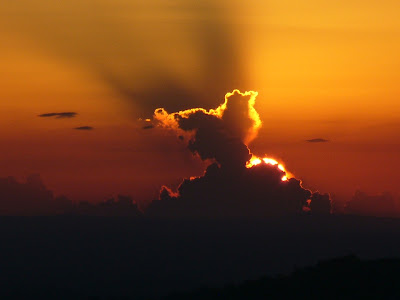

18 December 2008
The word
process can be understood more deeper when we
do something with what we know. This
doing gives the needed experience for learning, unlearning, reflection, initiative, and a better sense of the micro-level things that needs to be done to bring about macro-level changes.
Che and I feel that
process is often compartmentalized, boxed to such a degree that people often miss the big picture and turn themselves into specializing within certain compartments or boxes. Facilitating process aimed at non-violent social change can be a very rewarding and fulfilling experience (frustrations are a big part of it too). And at times it can jail us in a golden cage. It is only
consciousness and
intent to be free from many chains, that help us to see the bigger picture and act with wisdom.
Imagine how much human intervention has changed the habitat of the tortoise/turtle. It is a slow process: every second, minute, hour and day effluents affect the habitat of many species. Many of the changes are irreversible and many species are affected adversely. The rate at which we are polluting, degrading and destroying land, water, air and atmosphere - is a process in which we are all participants willing, unwilling or ignorant. A crisis of such magnitude requires process clarity on part of all governments and all people.
If humans become indifferent to conducting a slow genocide on all species that in the opinion of "experts" is not economically viable, valuable or profitable or even worse seen as a pest - our children and great grand children will read about our life times as the era when
Crimes Against Earth & Diverse Life Forms was done at an industrial/global level. We would be the equivalent of the Nazi sympathizers and supporters who tolerated and allowed the injustices to increase and unfold.
"Let them Be. We are all inter-related. Proclaiming victory from a mountain of skeletons or the void left by extinct species is ugly, shameful and foolish."
A piece of art has the capacity to evoke thought processes - the structure, perspective, colours, strokes, framing, highlights, backdrop, icons, cultural symbols found in Che's work is an amazing feat in balancing, layering with room enough for anarchical impulses that sometimes takes over an artist upon completion of the work. What do we do with what we have created? More recent painting of Che highlights the blood-spill that occurs all around that often goes unnoticed. Che felt that violence has reached a saturation level in our societies. It is so obvious that it requires distraction from reality to not see it, he often remarked.
When i first saw the painting it evoked in me images of how fast i have been running in comparison. It helped me slow down. For long i have held the tortoise/turtle as characterising wisdom, endurance, instinct, adaptability and many other significant qualities. The slowing down also helped ask a more important question of what i was running after, and was it necessary and important enough?
Many months after asking that question the introductory class with Rashid Omar where he had asked all students to introduce themselves using only 7 words, came into my consciousness. Two years after that class session, i feel what those 7 words are for me.
Question, Devotion, Wisdom, Justice, Peace, Love and Harmony
These words carry hope for me in re-inventing and evolving. As i said before, some processes take time, and they become almost invisible, but then as some wise woman from Manipur once said to me,"Necessity is a Mother of Evolution."
(Art work by Che. From
Process & Structure series)
 29 December 2008
29 December 2008






